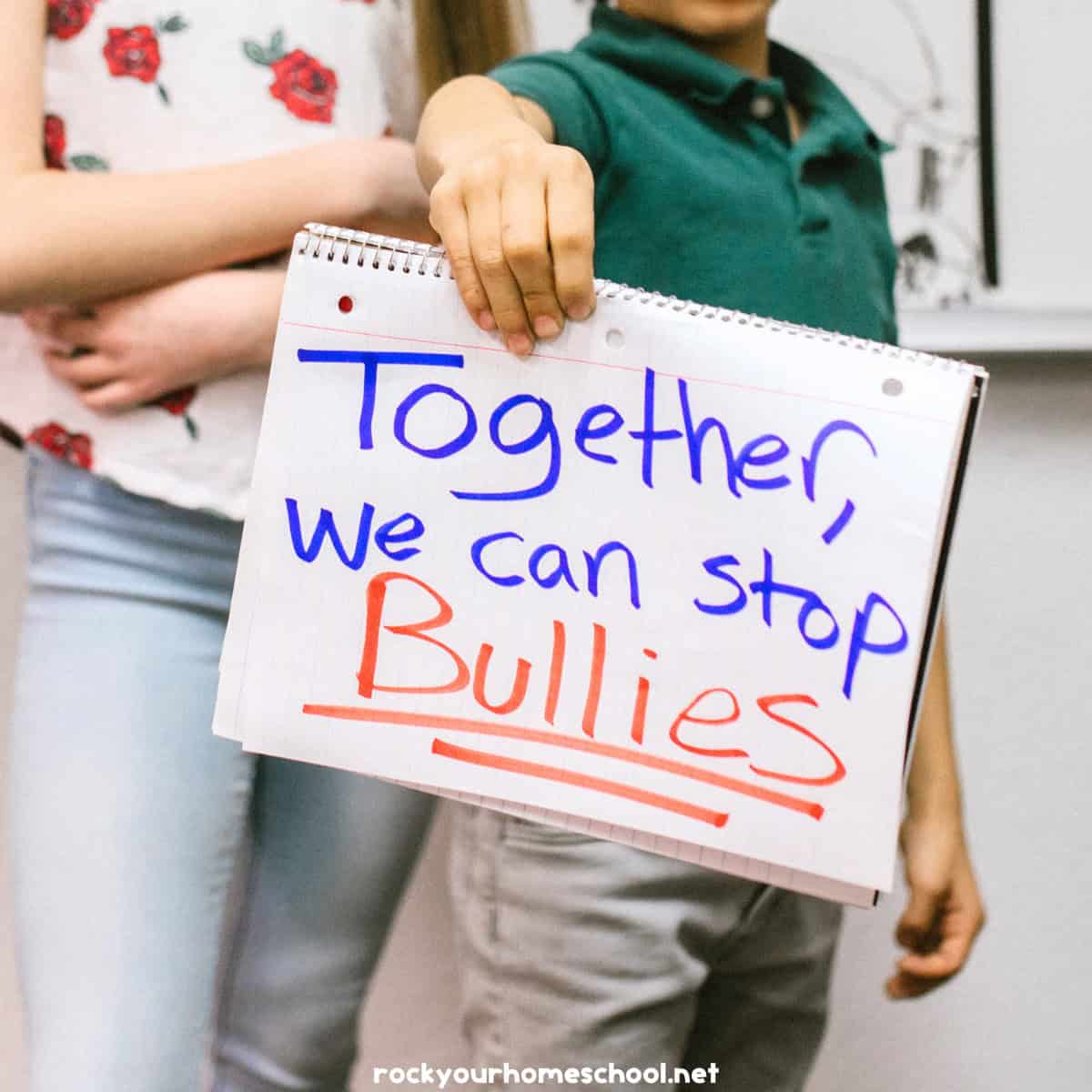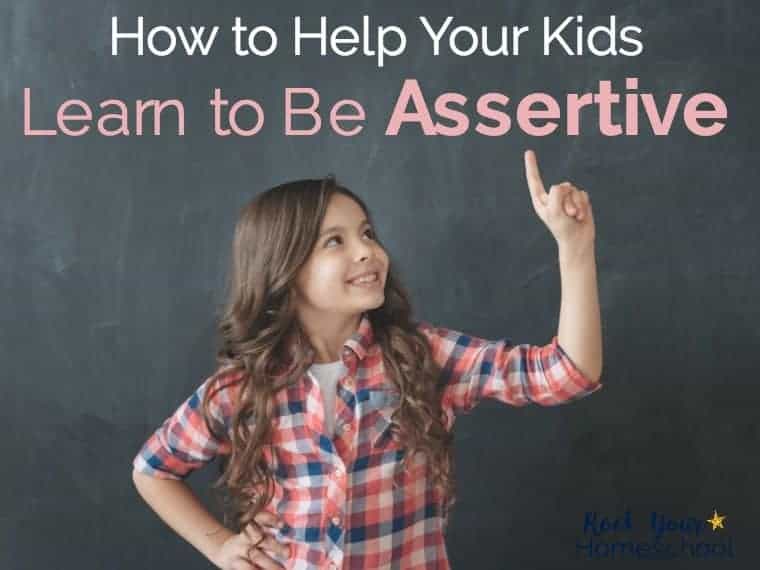Helping your child overcome bullying is not something that you expect to do when you first hold your precious newborn. You are focused on the beauty of new life and the addition to your family.
Sure, you want to protect your child from all that is nasty and horrible in this world. But, you are consumed with baby coos and making sure diapers are securely fit.
Bullying is such a hot yet taboo topic. We know that bullying is there but not many want to discuss or deal with it. We have all heard the cries for an end to bullying in public schools and in society in general.
That’s why I think that developing growth mindset skills and learning about ways to stop bullying is so important!

Our Experiences with Bullying
When I was a graduate student working on my Master’s degree in Community Counseling, I was trained to learn how to help children identify bullying behaviors and situations plus what to do about it. I went into local public schools to work in small groups with students to teach and role-play appropriate ways to handle a bully. (I never had to address cyberbullying, another huge problem!)
Never in my life did I expect to have to use that training to help my own children!
Call me naive. Or perhaps arrogant? I knew that I would work with my kids to develop positive assertiveness skills. I wanted to help my kids have emotional intelligence and communication skills to avoid any type of bullying situation.
Life was sweet until public school age hit. And then-BOOM! A whole new world was revealed to our family. A world containing some kids who were downright horrid to one another, critical and hurtful in such sneaky ways.
Before I share our family’s story with bullying, please accept my sincere condolences if your child or yourself have ever, or are currently, experiencing bullying. It is never an okay situation and it is completely acceptable to do something about it.

My Family’s Story With Bullying
I was fortunate to never have been on the receiving or giving ends of bullying. I truly have no idea why. My tween and teen years had me with glasses, braces, and long stringy hair with my nose stuck in a book, I really would have been a great target for bullies. Somehow, I managed to escape anything that would technically be called bullying.
My oldest, however, has not been so lucky. He attended local public school through third grade. There was an incident when a “problem” boy decided to approach my son during recess and punch him in the face (very dangerous with my son having vision in only one eye). Luckily, Captain was wearing his rec specs (sports goggles) and no physical damage was done.
Mentally and emotionally, however, my son went through the wringer. Both boys were forced to go the principal’s office. The other boy pretty much had a spot reserved on that hard wooden bench.
My son, six at the time, sobbed hysterically. He had no idea what he had done wrong (which was nothing). After an hour of waiting, it was determined that the other boy “just had a bad day” and was dismissed. In our phone conversation, the vice principal told me “boys will be boys”.
Um, no. Physical bullying is never okay.
My oldest has now been homeschooled for six years. (We pulled him out of school for a variety of reasons, not just that incident.) Overall, Captain has not had any troubles with his former public school friends. He gets the occasional “When are you coming back?” and “Isn’t it boring doing nothing all day?”. Initially amused, he gets annoyed with comments but shrugs them off.
In our school district, homeschoolers are eligible to play sports. Captain is a soccer enthusiast and has played for ten years. We feel blessed that he is able to continue to pursue this passion and homeschool at the same time. When he entered the middle school years, Captain was allowed to play for the school team.
It was a doozy. I have never witnessed such unsportsmanlike behavior in my entire life-from his own team! The level of negativity and criticism on and off the field was deplorable-with twelve, thirteen, and fourteen-year-olds (but, that is for a separate post-The Downfall Of Youth Sports In Our Modern World!).
Our main issue-and current topic-was bullying. Sneaky, nasty, undeniable bullying. Ostracized for no reason. Subtle and not-so-subtle threats that were vague enough to have no proof yet sent my son into fits of anxiety (which he had in second and third grade during his public school years).
The type of bullying that my son received was mental and emotional. He was the tallest and biggest player on the team by far. No specific physical threats were made. These kids just knew how to push his buttons. Captain is a mild-mannered strong type, following directions and doing what needs to be done. He would never think to retaliate.
He held his head high throughout the season and did his job on the field. Captain never gave up. And I couldn’t be prouder of my son.
It was heartbreaking, however, to have him come to me with tears in his eyes and his chin aquiver with only two weeks left in the season. He had enough and didn’t know what to do.
A few of the players (including two captains) were repeatedly threatening my son. The hardest part of all of this is that these players used to be some of his very best friends. Captain had no idea what was going on nor what to do about it.
I’ll sum it up with saying that I stepped in and contacted the coach. Issues were addressed but, at this point, the season had ended.
Yet, the effects of the bullying linger on for my son. As I continue to work with him to build up his assertiveness and self-esteem, I feel called to discuss here ways that you can help your child overcome bullying.

10 Powerful Ways To Help Kids Deal with Bullying
1. Recognize Changes In Your Child
It can be hard to determine the causes of changing attitudes and behaviors in your kids. Many factors , such as sleep, nutrition, and hormones, play a role. StopBullying.Gov provides these warning signs if a child is being bullied.
2. Ask Questions & Talk To Your Child
Sit with your child and discuss what is going on. Bring up the subject in general, conversational ways and see what your child shares. Ask for more details as your child begins to feel more comfortable.
3. Push-But Not Too Hard
You don’t want to nag, but don’t give up asking about your observations and getting more information. Kids are often afraid to speak up because they don’t want to be viewed as a tattle-tale or rat. Sometimes, kids need gentle inquiries to spark a conversation about bullying.
4. Investigate
Talk to other parents or individuals who may have information about the situation. Direct or indirect questions can help you gather the information you need to help your child. You may be surprised how quickly other parents and kids speak up when given the chance to voice their own concerns.
5. Be There For Your Child
As hard as it is, try to remain nonjudgmental. Your role is to gather information so you can assess the situation and appropriately proceed. You may be tempted to explode in anger and disgust about the bully or burst into tears over the hurt your child is experiencing. Work to control your own emotions to be fully present for your child.
6. Encourage Positive Friendships
What other kids in your child’s life are positive influences? Who do they feel comfortable hanging out with? Help your child form connections with these kids. Make an effort to provide opportunities for your child to get together with and build positive relationships with peers.
7. Teach Assertiveness Skills
When your child is able to communicate their thoughts and feelings in an assertive manner, their self-confidence will grow. Give your child the tools that they need to effectively deal with bullies. PsychCentral provides this helpful information to help you teach your kids about being assertive.
8. Role Playing
Practice assertiveness skills and possible solutions on how to handle bullies. You and your child can alternate between being the bully and the victim. Remember to consider body language and tone of voice in your role play.
9. Talk About Characteristics To Look For In A True Friend
Discuss with your child about characteristics they should look for and avoid in a friend. Kids Activities Blog shares Teaching Kids Life Skills: Being A Good Friend with ideas and resources on this important life skill. Thriving Family proposes these Traits Of A Good Friend.
10. Get Help
If you have any concern about your child’s health and safety, immediately get help. Bullying can have negative and long-lasting effects. It is always better to be safe than sorry.
I reached out to my readers and a few shared their stories. Amanda shared her story of being bullied as a child and stated, “Sometimes we can’t escape the bullies but we can change how we react to them.” Kelly’s son (who was recently diagnosed with high functioning autism, told me about how her son was physically bullied in first grade in public school and how homeschooling has helped him overcome this horrible experience. Kelly stated, “We have also made certain that my son knows several adults/leaders who are his ‘safe people’ and whom he can approach if he feels threatened, teased or bullied.”
Although it is saddening to hear others’ stories, it can help to know you and your family are not alone. The more of us who stand up for our kids and ourselves, the better it will be for all.

Positive Steps Moving Forward to Stop Bullying
Another HUGE issues that our kids are facing in our modern world is cyber bullying. UNICEF shares this amazing resource on Cyberbullying: What it is and how to stop it. Read this material to educate yourself on ways to help your kids positively handle cyber bullying.
Thank you for reading our story. It is by no means the worst bullying story out there but it has had a tremendous impact on our family. I pray that your family never has had nor will go through bullying. If you ever need them, I hope that these tips will benefit you as you help your child overcome bullying.
Do you have a loved one that had suffered from bullying?
Please share this post with anyone who could benefit from overcoming bullying!













Bullying is a big problem.
My son now 12 and struggeling to get him into a school wich can assist him in his scholar ship.
I had him in one school been bullying in the one school i took him out into another school with wonderfull teachers but kifs was the problem.because my son is little bit overweight some kids teached him,hit him called him names made fun of him and i ended up going to school.
The class teacher talked to the bully she talked to the parents and the bully didnt stop.
My child fell behind,always excuses not to go to school.
Was emotional,unhappy so i ended up taking him out started homeschool.
But the problem is now im a working mother,cant aford to pay the homeschool and tutor and trying to do homeschool afterwork after hours and weekend.
But ended up to fell so behind.and now im trying to get him back in a midstream school,and no school can helps me.
When he fell behind in school they insist me to take him to a special school to get tested to see if he can be assist in that midstream school but the school that tested him said hes knowledge is to far behind and they cant assist me.
They told me i must take him back to the school where he was untill the year he turns 13 then take him to a special school.
Left with no choice trying to do what im doing and see if i can let him read and write in my spare time after work i try to do it like that.
But then ive heard about a school thats 15 km away that works with autism kids and they are more then willing to assist my child,but a non profit school and nor a goverment school i struggle to get a donation from a donar to help me get him in the school cause school fees are very high.
So im back where i ended and heartbreaking all the time because off a bully and parents that dont want to see anything wrong in their child.